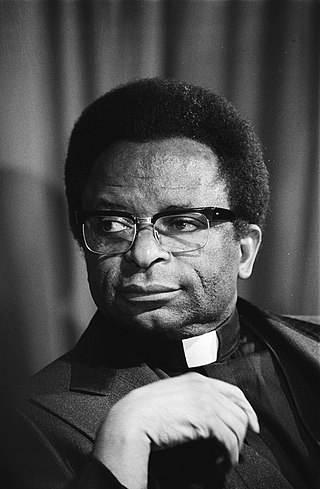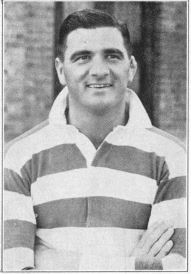
The New Zealand national rugby union team, commonly known as the All Blacks, represents New Zealand in men's international rugby union, which is considered the country's national sport. Famed for their international success, the All Blacks have often been regarded as one of the most successful sports teams in history.

Matabeleland is a region located in southwestern Zimbabwe that is divided into three provinces: Matabeleland North, Bulawayo, and Matabeleland South. These provinces are in the west and south-west of Zimbabwe, between the Limpopo and Zambezi rivers and are further separated from Midlands by the Shangani River in central Zimbabwe. The region is named after its inhabitants, the Ndebele people who were called "Amatabele"(people with long spears – Mzilikazi 's group of people who were escaping the Mfecani wars). Other ethnic groups who inhabit parts of Matabeleland include the Tonga, Bakalanga, Venda, Nambya, Khoisan, Xhosa, Sotho, Tswana, and Tsonga.

The Zimbabwe national rugby union team, nicknamed the Sables, represents the Zimbabwe Rugby Union in international competition. While sides representing the colony of Rhodesia have played as early as 1910, the modern day Zimbabwe rugby team did not play its first test until 1981, against Kenya. Zimbabwe has competed in two World Cups, in 1987 and 1991, in place of South Africa, who were sanctioned by the IRB at the time due to apartheid. Zimbabwe is categorized as Tier 3 Development One, which prioritizes Zimbabwe over other nations due to historical success as well as popularity of rugby in the nation.

Anthony John Pithey was a Rhodesian cricketer who played in seventeen Test matches for South Africa between 1957 and 1965. He also made 65 appearances for Rhodesia, captaining them 34 times.
Christopher Anthony Russell Duckworth was a Rhodesian cricketer who played in two Tests for South Africa in 1957.

The Rhodesia cricket team played first-class cricket and represented originally the British colony of Southern Rhodesia and later the unilaterally independent state of Rhodesia which became Zimbabwe. In 1980 the Rhodesia cricket team was renamed as the Zimbabwe-Rhodesia cricket team, and in 1981 it adopted its current name of the Zimbabwe national cricket team.

General elections were held in Rhodesia in April 1979, the first where the majority black population elected the majority of seats in parliament. The elections were held following the Internal Settlement negotiated by the Rhodesian Front government of Ian Smith and were intended to provide a peaceful transition to majority rule on terms not harmful to White Rhodesians. In accordance with the Internal Settlement, on 1 June, Rhodesia officially became the nation of Zimbabwe Rhodesia, under the government of the United African National Council elected in the 1979 elections. The Internal Settlement was not approved internationally but the incoming government under Bishop Abel Muzorewa did decide to participate in the Lancaster House talks which led to the end of the dispute and the creation of Zimbabwe.

The First Matabele War was fought between 1893 and 1894 in modern-day Zimbabwe. It pitted the British South Africa Company against the Ndebele (Matabele) Kingdom. Lobengula, king of the Ndebele, had tried to avoid outright war with the company's pioneers because he and his advisors were mindful of the destructive power of European-produced weapons on traditional Matabele impis attacking in massed ranks. Lobengula reportedly could muster 80,000 spearmen and 20,000 riflemen, armed with Martini-Henry rifles, which were modern arms at that time. However, poor training may have resulted in the weapons not being used effectively.
The history of cricket in Zimbabwe, formerly Rhodesia and before 1965 Southern Rhodesia, includes Rhodesia first forming a first-class cricket team in August 1890, and the inaugural Test appearance of Zimbabwe in October 1992.

The military history of Zimbabwe chronicles a vast time period and complex events from the dawn of history until the present time. It covers invasions of native peoples of Africa, encroachment by Europeans, and civil conflict.
Ian McIntosh was a Southern Rhodesian-born Zimbabwean rugby union coach. He served as head coach for the Springboks during 1993 and 1994.
Rugby union in Zambia is a minor but growing sport. The Zambia national rugby union team is currently ranked 67th by World Rugby. The Zambia Rugby Football Union has 9880 registered players and three formally organised clubs.

Rugby union in Zimbabwe is a popular sport and ranks after association football and cricket as one of the oldest and most popular sports in the country. The Zimbabwe national team, commonly known as the Sables, have been playing international rugby since the early 1900s and have made appearances in two Rugby World Cups Zimbabwe at the Rugby World Cup on two occasions. As with rugby union in Namibia, the country's lack of a professional structure, and opportunity for player's to earn an income playing rugby, has been a problem for national organisers.

The history of the Jews in Zimbabwe reaches back over one century. Present-day Zimbabwe was formerly known as Southern Rhodesia and later as Rhodesia.

The Shangani Patrol was a 34-soldier unit of the British South Africa Company that in 1893 was ambushed and annihilated by more than 3,000 Matabele warriors in pre-Southern Rhodesia, during the First Matabele War. Headed by Major Allan Wilson, the patrol was attacked just north of the Shangani River in Matabeleland, Rhodesia. Its dramatic last stand, sometimes called "Wilson's Last Stand", achieved a prominent place in the British public imagination and, subsequently, in Rhodesian history, similarly to events such as the Battle of the Little Bighorn and the Battle of the Alamo in the United States.

The Zimbabwe men's national field hockey team is the team that represents Zimbabwe in the sport of field hockey. Field hockey has the second biggest player base in the country after football. Currently, Zimbabwe has four pitches, two in Bulawayo – one water base and one sand filled – and another sand filled at the Arundel School and water base at St John's College in the capital city of Harare. Bulawayo has approximately 1,000 hockey players and Harare 8,000. The 5,000-capacity Khumalo Hockey Stadium in Bulawayo is their home stadium. Field hockey club Skies Hockey Club also use the venue for home games. They are currently ranked 61st in International hockey ranking. While the country had a tradition in the sport, they struggled in recent times largely due to their inability to participate in international competitions organized by the African Hockey Federation (AfHF) and the International Hockey Federation (FIH), until the Khumalo Hockey Stadium was refurbished and played host to the 2011 African Olympic Qualifier.
Desmond Charles van Jaarsveldt is a Rhodesian-born South African retired rugby union player and former captain of the Springboks. He was nicknamed the "Bald Eagle" due to his pace on the wing and bald head. He became the first Rhodesian to captain South Africa. Upon retiring from playing, he acted as a coach and administrator for Rhodesian rugby during the transition of the country into Zimbabwe.
David John Smith is a South African former rugby union footballer.

John Clother Morkel was a South African-born Rhodesian international rugby union player. He was born in Cape Town, Union of South Africa and was the captain of the Rhodesia national rugby union team and played as a lock.
William John McKeown Conrad was a New Zealand rugby union international.













